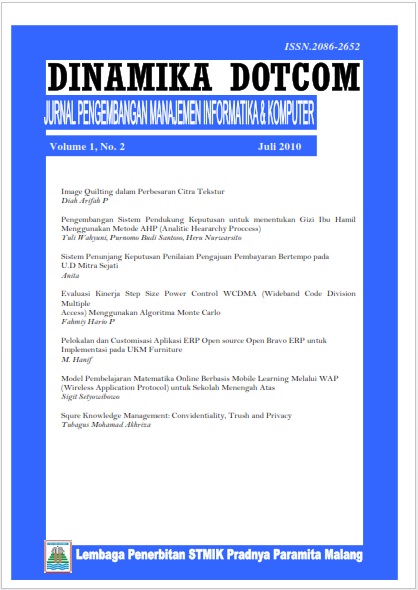SECURE KNOWLEDGE MANAGEMENT: CONFIDENTIALITY, TRUST AND PRIVACY
Abstract
Knowledge is one of the most important assets for an organization or a company. The knowledge in a company is the intellectual capital which could make the company keeps alive and competitive. As an important asset, the company’s knowledge should be managed securely. In this paper, the author limits the discussion of the aspect of secure knowledge management to confidentiality, trust and privacy. For confidentiality, author discusses Role Based Access Control (RBAC) and Usage Control (UCON). Then we move to discuss the trust management and negotiation and stress the topic to trust negotiation (TN). Finally the author discusses about the privacy management. The conclusion is because the knowledge management is an important asset of organization as the intellectual capital, so security has to be incorporated into the knowledge-management lifecycle especially on integrating security strategy with knowledge management and business strategies of an organization.References
Elisa Bertino, Latifur R. Khan, Ravi Sandhu, and Bhavani Thuraisingham. 2006. Secure Knowledge Management: Confidentiality, Trust, and Privacy. IEEE Explore
Ravi S. Sandhu, Edward J. Coyne, Hal L. Feinstein and Charles E. Youmank. 1996. Role-Based Access Control Models. IEEE Computer
Eric Z. Leonard and Jim Lathrop. 2010. Integrating Systems Management Server 2.0 with Novell NetWare. http://technet.microsoft.com/en-us/library/cc750160.aspx
Sakari Kouti and Mika Seitsonen. 2002. Managing OUs, Users, and Groups in Active Directory. 2002. http://www.informit.com/articles/article.aspx?p=26918
Jaehong Park and Ravi Sandhu. 2004. The UCONABC Usage Control Model. ACM Transactions on Information and System Security
Jeremy Epstein and Ravi Sandhu. 1996. NetWare 4 as an Example of Role-Based Access Control. ACM RBAC Workshop, MD, USA.


